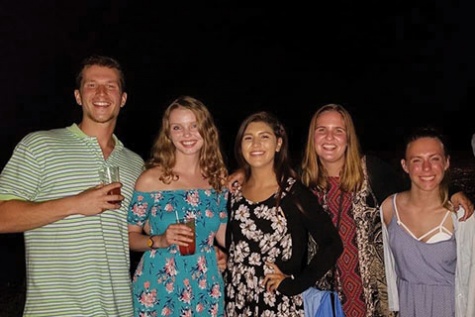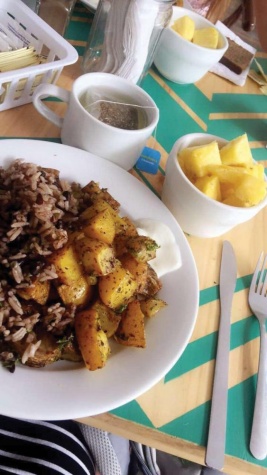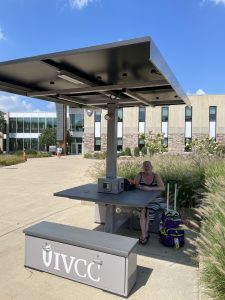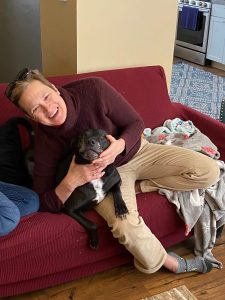‘Now is the time to study abroad’
IVCC’s study abroad programs are affordable, challenging
Stephanie Bias, sophomore, overlooks La Paz Waterfall Gardens in Alajuela, Costa Rica. Bias travelled to Costa Rica and was the only IVCC student to study abroad this summer through the ICISP study abroad program.
October 12, 2017
According to the Association of International Educators (NAFSA), just over 1.5 percent of American students enrolled at higher education institutions studied abroad in 2015. This statistic translates to only 313,415 students, the majority of whom chose to study in Europe or Latin America.
Very few students choose to study abroad, and with good reason. Studying abroad is expensive when considering tuition, airfare, housing and personal expenses. However, there are many programs and scholarships that exist solely to help students afford an international experience. These resources exist because many people, myself included, believe that study abroad programs should be more affordable and inclusive.

IVCC student Stephanie Bias, second from left, poses with other students from the ICISP study abroad program. The students dined at Mirador Ram Luna Restuarante, an upscale restaurant that overlooks the city of San Jose, Costa Rica.
Many students may be surprised to learn that Illinois Valley Community College offers affordable study abroad programs. These programs exist due to the fact that IVCC is a member of the Illinois Consortium for International Studies and Programs (ICISP), an organization that offers various study abroad opportunities through the College of DuPage (COD) in Glen Ellyn, Illinois.
IVCC and ICISP currently offer programs of differing lengths to Austria, Costa Rica, France, England, Ireland and Spain. Some programs allow you to study abroad for an entire semester, while others last only a few weeks. Depending on the length of the program, 18 to six transferrable credits can be earned.
According to Steve Alvin, IVCC’s study abroad coordinator, IVCC sends about two students abroad every year. Alvin believes that now is the best time for IVCC students to study abroad because it is easier to find programs that offer general education courses rather than specialized courses. For example, students are more likely to find programs that offer intermediate math classes rather than advanced biochemistry classes.
IVCC’s study abroad program also allows students to bypass the unreasonable tuition fees that most four-year universities impose on similar experiences.
“Our programs are geared towards the community college student. While they may seem to be expensive, our programs are actually thousands of dollars cheaper than the programs at four year schools,” Alvin said.
I did not know that IVCC offers classes abroad until my second semester at IVCC. After learning about the programs through a faculty member, I realized that I may be able to afford an experience abroad. I decided to apply. The College of DuPage directors reviewed my application, and four weeks later, I was informed that I would soon be studying Spanish in Costa Rica.
I studied in San José, Costa Rica from May 24 through June 24. Despite the fact that I did not know any Spanish, I knew that I could not turn down this opportunity. I chose to move outside of my comfort zone, and because of this, my appreciation for other cultures expanded and my global perspectives broadened.
The program placed me with a host family in the neighborhood of Curridabat. I struggled immensely with this element of my experience because I could hardly communicate with my “host mother.” The language barrier divided us and forced me to depend on my pocket dictionary and my roommate’s elementary Spanish vocabulary.
This challenge caused an enormous amount of frustration for me, but thanks to my Spanish teacher, I learned how to form complete sentences and maintain simple conversations by the end of my trip. Learning to speak Spanish was perhaps the most rewarding aspect of my experience abroad.
In addition to the language barrier, safety was a major concern. The directors constantly warned us to hold our backpacks against our chests, always walk in groups and never talk to strangers. Despite these warnings, numerous incidents occurred. One of the girls in our group was robbed at knifepoint in a park on a Saturday morning, and three days later, one of the boys was circled and robbed by four men at a soccer game.
However, my time in Costa Rica was not all bad. In fact, the hard parts are what made my experience worthwhile. I was pushed outside of my comfort zone every day and learned that I am capable of surviving seven hour public bus rides, a 101 degree fever in the middle of the jungle, my fear of heights and much more. I bonded over these experiences with other students and subsequently became friends with a number of amazing people, four of whom I still talk to regularly.
The College of DuPage and Costa Rican Language Academy (CRLA) coordinated a variety of excursions for our group. We hiked through the waterfalls of La Paz, toured banana and coffee plantations, explored Manuel Antonio National Park and worked with children at an orphanage. These experiences broadened my global perspectives and led me to realize that an entire world exists beyond the cornfields of Illinois.
In addition to exploring new places, I also tasted new foods while abroad. Costa Rica is a relatively poor country, and because of this, most locals enjoy cheap vegetarian foods such as rice, beans and potatoes. Gallo pinto, a mixture of rice and beans, accompanied almost every meal I was served. As a vegetarian, I was very happy with the food choices.
The vast selections and affordable prices of the fresh produce were especially memorable. I tasted many new tropical fruits such as passion fruit, pitaya and guanabana. Also known as soursop, guanabana tastes like a combination of pineapple and banana. This delicious fruit became an obsession of mine while abroad and I continue to look for it in ethnic grocery stores.
Saying goodbye to the beautiful country of Costa Rica, my host family and Spanish teacher was very difficult. I was pushed to my limits daily and often felt physically and emotionally exhausted. However, despite the challenges that arose, I would not change a single aspect of my experience abroad.

A typical Costa Rican meal of fruit, potatoes and gallo pinto, a traditional mixture of rice and beans, is served at a hostel. Fresh, affordable foods are readily available in Costa Rica.
The unofficial saying of Costa Rica is “Pura Vida,” which roughly translates to “Pure Life.” I often heard this saying used in place of phrases such as “Have a good day,” “Good morning” or “I love you.” Pura Vida is a catch-all phrase that embodies the friendly and humble nature of Costa Ricans. One girl felt so moved by our experience abroad that she paid a local tattoo artist to tattoo Pura Vida on her arm.
If IVCC did not offer study abroad programs, I would have never travelled to Costa Rica or learned the meaning of Pura Vida. I would have never formed new friendships, learned Spanish, tasted new foods or discovered that I enjoy travelling.
All students should have the opportunity to study abroad. Due to the fast-paced, unpredictable and volatile nature of our modern world, the United States needs more citizens who can recognize that the world does not end where our borders do. The United States is only one of 195 independent countries. We need more people who can recognize, understand and embrace the differences of other cultures rather than reject and debase them.
I encourage students to take advantage of IVCC’s study abroad opportunities. I highly recommend the Costa Rica program due to the fact that it is the cheapest program available and includes the most in terms of airfare, food and housing. Now is the ideal time to study abroad for most community college students.
Steve Alvin believes that studying abroad can be a worthwhile experience for students.
“I cannot begin to tell you how many students over the years have told me how glad they were that they moved out of their comfort zone and experienced life in a foreign country. [Their experience] made them better persons and better students,” Alvin said.
If you are interested in studying abroad, visit www.icisp.org/ICISP/index.htm or contact Steve Alvin at [email protected]. If you have any questions regarding the Costa Rica program, feel free to email me at [email protected]. An experience abroad could change your life.




